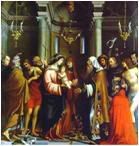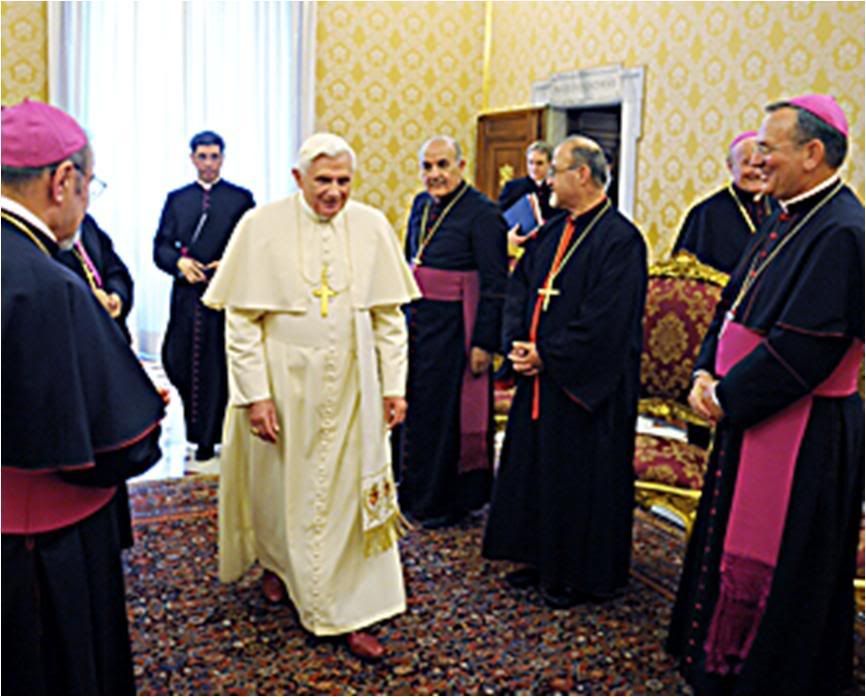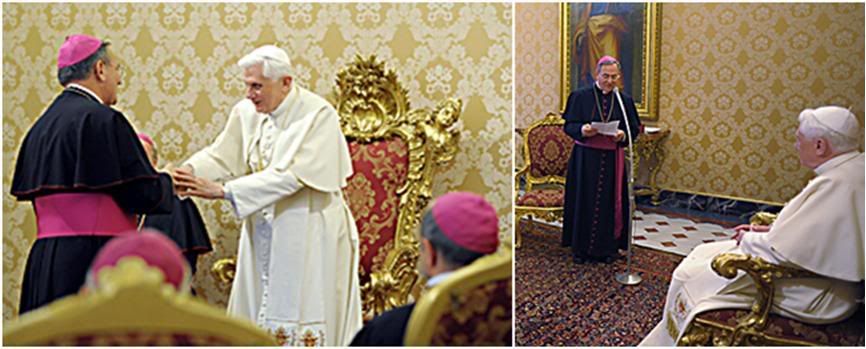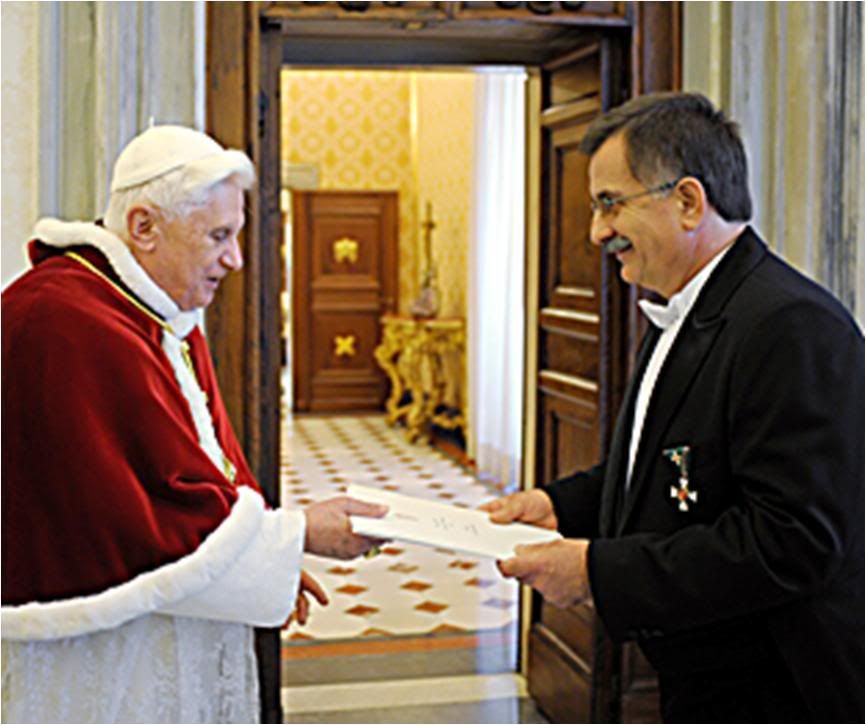
February 2
 Feast of the Pressentation of Jesus in the Temple
Feast of the Pressentation of Jesus in the Temple
No OR today.
THE POPE'S DAY
The Holy Father met today with
- H.E. János Balassa, Ambassador of Hungary, who presented his credentials. Address in English.
- Bishops of Turkey on ad limina visit, individually, then as a group. Address in French.
In the early evening, he addressed the religious of Rome after Mass at St. Peter's Basilica on the occasion
of the Day for Consecrated Life today observed on the Feast of the Presentation of Jesus at the Temple.
Address in Italian.
The Vatican released the text of the message sent by the Holy Father too His Holiness Kiril, Patriarch of Moscow,
on his enthronement yesterday. Text in English.
****
THE POPE'S PRAYER INTENTIONS FOR FEBRUARY
General prayer intention:
"That the pastors of the Church may always be docile to the action of the Holy Spirit in their teaching
and in their service to God's people".
Mission intention:
"That the Church in Africa may find adequate ways and means to promote reconciliation, justice and peace
efficaciously, according to the indications of the Second Special Assembly for Africa of the Synod of Bishops".
WITH THE BISHOPS OF TURKEY:
FOR FREEDOM OF RELIGION AND WORSHIP


VATICAN CITY, 2 FEB 2009 (VIS) - Bishops from the Episcopal Conference of Turkey were received this morning by
the Holy Father, at the end of their "ad limina" visit.
A visit, he told them, "that is providentially taking place in the year dedicated to St. Paul", and assumes particular
importance because the prelates "are pastors ... in the land where the Apostle of the Gentiles was born and where
he founded many communities".
"I know that in your country you have given particular emphasis to this Jubilee Year, and that many pilgrims are visiting
the sites so dear to the Christian tradition. My wish is that they may find easier access to those places which are
so significant for the Christian faith, and to liturgical celebrations", said the Pope.
Commenting on the "ecumenical dimension" of the Pauline year, he expressed the hope that this "may make further progress
possible along the path of unity of all Christians".
Benedict XVI went on to recall the "rich history" of the Church in Turkey, a history marked "by the development of
the first Christian communities" and by such names as St. John and St. Ignatius of Antioch.
As for the modern age, "Benedict XV and Blessed John XXIII also figure in the life of the nation and of the Church
in Turkey", said the Pope, going on to mention Fr. Andrea Santoro, an Italian priest killed in the Turkish city of Trabzon
on 5 February 2006.
"May this prestigious history be for your communities - the vigour of whose faith and abnegation under trial I am well aware -
not only a reminder of a glorious past, but also a stimulus to continue with generosity along the journey you have begun,
bearing witness among your brothers and sisters to God's love for all human beings".
"In ecclesial communion the people of God will find an effective support for their faith and hope", he said. "Bishops are
primarily responsible for the concrete realisation of that union. The profound communion that must exist among them, in
the diversity of rites, is expressed above all in the true fraternity and mutual collaboration that enables them to carry out
their ministry in a collegial spirit, strengthening the body of Christ".
"The Christian community in your country, lives in a nation governed by a constitution that affirms the lay nature of the State,
but where the majority of the population is Muslim. For this reason it is very important for Christians and Muslims to work
together to promote humanity, life, peace and justice, The distinction between the civil and the religious sphere
is clearly a value that deserves to be protected".
 Holy Father calls for
Holy Father calls for
freedom of religion and worship in Turkey

Vatican City, Feb 2, 2009 (CNA) - In his address to bishops from the Episcopal Conference of Turkey, who are visiting the Vatican
for their “ad limina” visit, Pope Benedict XVI stressed that it is up to the Turkish State to “provide effective guarantees that
all citizens and all religious communities may enjoy freedom of worship and religion.”
“In this context,” explained the Pope, “I am well aware of your desire and readiness to open a sincere dialogue with
the authorities in order to find a solution to the various problems your communities have to face, such as recognition for
the juridical status of the Catholic Church and her property."
He then stressed that the Turkish Christian community “lives in a nation governed by a constitution that affirms the lay nature
of the State, but where the majority of the population is Muslim. For this reason it is very important for Christians and Muslims
to work together to promote humanity, life, peace and justice.”
“The distinction between the civil and the religious sphere is clearly a value that deserves to be protected," he said.
Examining the religious sphere more closely, the Holy Father explained that within the Church “the people of God will find an
effective support for their faith and hope.” The bishops, he added, are “primarily responsible for the concrete realization”
of a union between the “diversity of rites” in the Turkish Church.
The Pontiff also noted that the visit of the bishops “is providentially taking place in the year dedicated to St. Paul”
and assumes a particular importance because the prelates “are pastors…in the land where the Apostle of the Gentiles was born
and where he founded many communities.”
Given the special emphasis brought by the Pauline Year, the Pope noted that many are traveling to see “the sites so dear
to the Christian tradition.” “My wish,” he said, “is that they may find easier access to those places which are so significant
for the Christian faith, and to liturgical celebrations.”
Benedict XVI also recalled the “rich history” of the Church in Turkey which is marked “by the development of the first Christian
communities” and by the likes of St. John and St. Ignatius of Antioch. More recently, the Church has also seen
the witness of Fr. Andrea Santoro, an Italian priest killed in the Turkish city of Trabzon on February 5, 2006,
Pope Benedict said.
"May this prestigious history be for your communities - the vigor of whose faith and abnegation under trial I am well aware -
not only a reminder of a glorious past, but also a stimulus to continue with generosity along the journey you have begun,
bearing witness among your brothers and sisters to God's love for all human beings," Benedict XVI prayed.
Wrapping up his address, the Holy Father asserted that inter-religious dialogue “cannot but have positive consequences
for everyone. It would be appropriate for permanent contacts to be established, for example through a bilateral commission,
in order to study as-yet unresolved questions."
Pope urges Hungary to defend Europe
by protecting the family


Vatican City, Feb 2, 2009 (CNA)- Pope Benedict took the occasion of welcoming Hungary’s new ambassador Monday morning
as an opportunity to encourage the country to defend the role of the family in Europe. In particular, the Holy Father
highlighted the right of parents to be the "primary educators" of their children.
After Janos Balassa presented his Letters of Credence, the new ambassador of Hungary to the Holy See, was addressed
in English by the Pope.
The Pope first spoke with Balassa about the "forces that govern economic and political affairs in the modern world," which
he said need to be "built upon an ethical foundation, giving priority always to the dignity and the rights of the human person
and the common good of humanity."
This task is one that Hungary is well-suited for by its "strong Christian heritage, stretching back over a thousand years,"
Pope Benedict pointed out.
"Hungary," he added, "is well placed to assist in the promotion of these humane ideals within the European community and
the wider world community, and it is my hope that our diplomatic relations will serve to support this vital dimension
of your country's contribution to international affairs."
The importance of the family for a vibrant society was also emphasized by the Pope.
Drawing upon his message for the 2008 World Day of Peace, Benedict XVI reminded the new diplomat that the family
is essential for "building peaceful community relations at every level."
Unfortunately, the "vital cohesive role" of the family is "being called into question and even endangered as a result
of misguided ways of thinking that at times find expression in aggressive social and political policies" in much
of modern Europe, he lamented.
"It is my earnest hope," the Pope said, "that ways will be found of safeguarding this essential element of our society,
which is the heart of every culture and nation."
"One of the specific ways government can support the family is by assuring that parents are allowed to exercise their
fundamental right as the primary educators of their children, which would include the option to send their children to
religious schools when they so desire," the Pontiff stated.
The difficult history of the Catholic Church in Hungary was also touched upon by Pope Benedict, who noted that "after
decades of oppression, sustained by the heroic witness of so many Christians," the Church has emerged to "take her place
in a transformed society, able once more to proclaim the Gospel freely. She seeks no privileges for herself, but is eager
to play her part in the life of the nation, true to her nature and mission."
[Modificato da TERESA BENEDETTA 02/02/2009 22:52]